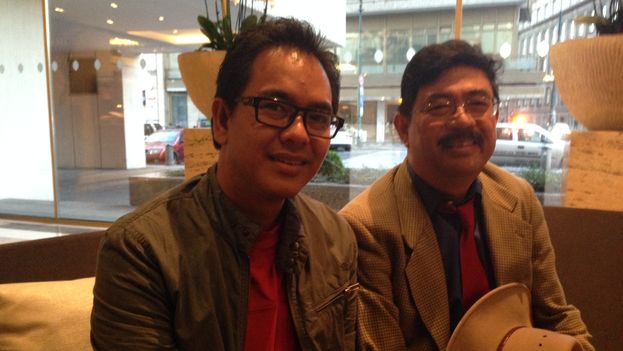
14ymedio, Yoani Sanchez, Prague, 15 October 2014 – A few years ago, when I was overcome with despair about the situation of my country, I thought about those who were in worse shape with regards to the lack of freedoms. Two nations invariably came to mind: North Korea and Burma. The first of these still tops the list of places where few want to live, while Myanmar (Burma) has undertaken a slow and imperfect process of opening.
In Prague I just met two Burmese who are contributing to these small changes, the blogger Nay Phone Latt and activist Soe Aung.
Question: Nay, you are just 34-years-old and you were arrested for spreading information about the 2007 protests in your country on the Internet, and then convinced of the alleged crime of violating the electronic law. Do you think that now the access to information is more free?
Nay Phone Latt: Right now there is less censorship in the media, it is not as strong as before. I’m speaking not only of digital media, but also of the written press that is subject to fewer controls on the part of the government. The problem we still have is that some of these media are in the hands of the ruling party and the others, which are private, belong to people who have very good relations with the military, so many are corrupt. However, there are always some who try to be independent.
There are still very clear limits on what you can write and what you can’t. For example if someone posts an article criticizing the Government and uncovering a corruption scandal, they can get into serious trouble and even end up in jail.
“There are still very clear limits on what you can write and what you can’t”
Q. How has the situation changed since the election in 2012?
Soe Aung: Currently in Burma we have a Parliament whose majority is still made up by the military. The Constitution reserves a quarter of the seats in parliament and 56 of the 24 Senate seats to the ruling Union Solidarity and Development Party. Meanwhile, the opposition National League for Democracy (LND) has barely 43 seats. Thus, it is every difficult to promote changes, becaue this isn’t a real democratic process.
Q. The Nobel Peace Prize winner, Aung San Suu Kyi is the most visible face of dissent in Burma What other opposition groups are calling for changes?
Soe Aung: There is the movement known as Generation 88, because there was a popular protest in 1988 against the military junta. These demonstrations, composed mostly of students, were brutally repressed. Currently the group is still very strong in Burmese society and demands a democratic and open society.
Q. What are the main problems for the Burmese people now?
Nay Phone Latt: First, the lack of trust in institutions, in the police, the judiciary and the government. People have a lot of disbelief, they are very skeptical. The whole society has lost trust in the military regime. We have lost the ability to believe.
Aung Soe R.: In my opinion, our biggest problem is still poverty. We still have very poor people in our country who do not even have a piece of land to grow their own food. We have experienced an economic opening but the big winners are the military and the people close to them who have become very rich.
